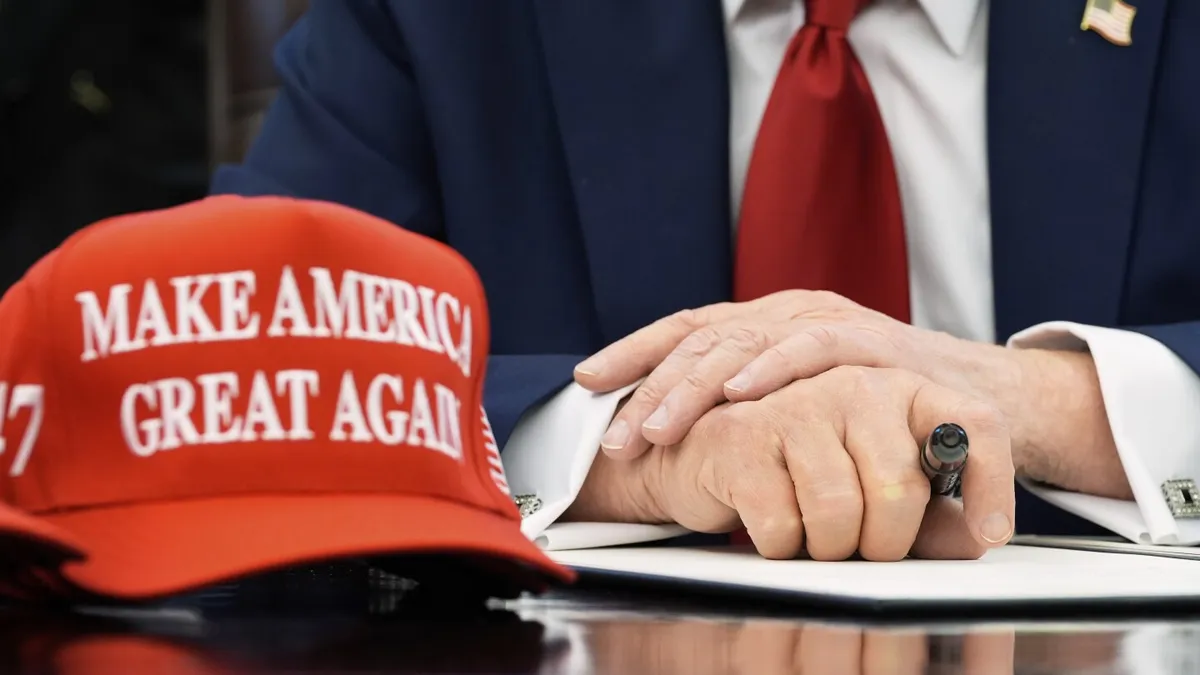
Since President Donald Trump returned to office, the weeks have been characterized by a flurry of activity aimed at demonstrating that his administration is steadfast in fulfilling its campaign promises. With a Republican-controlled Congress at his disposal, Trump has embarked on a mission to overhaul the federal government and reshape foreign policy. As he approaches his 100th day in office, the extent of his influence is evident, though the long-term implications remain ambiguous.
Many of the executive orders issued by Trump serve as declarations of intent or foundational steps toward future objectives. For instance, on his first day in office, he declared an energy emergency to facilitate increased production. However, Trump has indicated that tangible benefits—such as a significant reduction in utility bills—may not materialize until next year, leaving many voters in suspense.
Some of Trump's objectives appear to be at odds with one another. He has pledged to lower the cost of living while simultaneously imposing tariffs on foreign goods, which could likely drive prices higher. Additionally, several of his initiatives are facing legal scrutiny, raising questions about their validity and the potential for reversal as lawsuits progress through the courts.
Trump's promise to reduce prices has been a focal point of his agenda. Since peaking at 9.1% in 2022, inflation has been on a downward trend, dropping to 3% in January and 2.4% in March. Trump has confidently claimed, “We already solved inflation,” yet the Federal Reserve warns that his tariff proposals could lead to increased consumer prices. Furthermore, his ambitions to eliminate the national debt through tax cuts seem doubtful, as these cuts would reduce revenue needed to manage governmental expenses.
Trump has made significant strides in fulfilling his promise to control illegal immigration. The number of individuals attempting to cross the U.S.-Mexico border illegally saw a drastic drop during President Joe Biden's last year. For example, the figures plummeted from 249,740 in December 2023 to just 8,346 in February under Trump. Despite these successes, it's unclear if he has matched Biden's aggressive deportation figures from the previous year. Reports indicate that many individuals, including those like Kilmar Abrego Garcia—who was deported despite a lack of criminal charges—have been affected by his policies.
During his campaign, Trump promised voters that they would see a significant reduction in their energy bills within 12 to 18 months. While he has made bold claims about slashing energy costs by up to 75%, he has also cautioned that results may vary. His approach to tariffs on foreign goods could complicate the situation, as these tariffs might lead to increased prices for consumers.
Trump's administration has made it clear that he supports the use of tariffs to level the playing field in international trade. He has implemented tariffs on goods from several countries, including Canada, Mexico, and China, citing issues such as the influx of fentanyl. While he initially escalated these tariffs, he later indicated a willingness to negotiate, although substantial tariffs—some as high as 145%—remain in place.
Despite his campaign promises, Trump has not succeeded in resolving the ongoing conflict between Russia and Ukraine. He claimed that he could settle the war shortly after winning the presidency, yet this resolution has yet to materialize. Throughout the campaign, he maintained that he could end the conflict quickly, but those promises have gone unfulfilled.
Trump has proposed ambitious tax cuts, including the elimination of taxes on tips and overtime, as well as making permanent the expiring tax cuts from his first term. However, achieving these goals will require cooperation from Congress, which may prove challenging given the current political climate and the thin margins held by the GOP.
Trump's administration has sought to reshape higher education by threatening to withhold tax dollars from institutions that do not comply with his policies regarding antisemitism and diversity. His actions against universities like Harvard have included calls to revoke their tax-exempt status while freezing significant federal funding.
In addition to his educational reforms, Trump has moved swiftly to dismantle diversity, equity, and inclusion (DEI) programs that were established during the Biden administration. This initiative has involved purging references to diversity from federal communications and revising historical narratives within cultural institutions, including the Pentagon.
Trump has remained steadfast in his opposition to transgender athletes participating in women's sports and has signed executive orders to enforce these policies. His administration has also sought to challenge court rulings that block his attempts to remove transgender individuals from the military.
In an unexpected collaboration, Elon Musk engaged with Trump on creating a Department of Government Efficiency. Although this partnership has led to significant personnel changes within the federal bureaucracy, the anticipated savings have not yet materialized, raising questions about the effectiveness of these reforms.
After the January 6 Capitol riots, Trump initially condemned the violence but later referred to the rioters as “patriots” and pledged to pardon them. He has made good on this promise, issuing pardons to approximately 1,500 individuals involved in the unrest.
Trump's administration has taken notable steps to promote fossil fuel production, including signing executive orders aimed at reversing environmental regulations. However, critics point out that some of his actions may lack substantial backing, such as attempts to dismantle nonbinding goals set by the previous administration regarding electric vehicles.
As Trump reaches the end of his first 100 days in office, the implications of his actions are still unfolding. The progress on his promises continues to generate discussions on both sides of the political spectrum, and the long-term impacts remain to be seen.